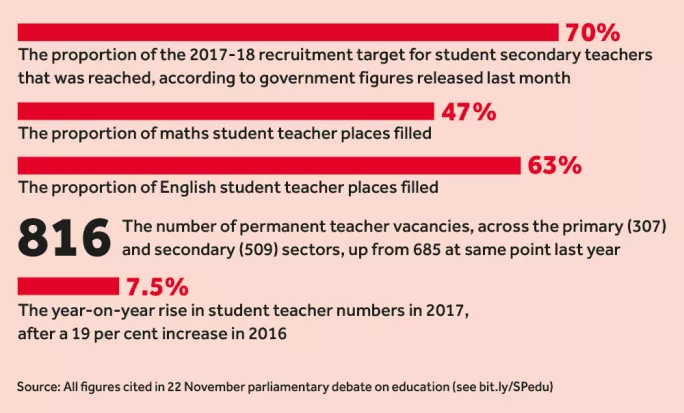Heads ‘don’t have time to handle recruitment’

Concerns have been raised in Parliament that some heads are already being told to take on the burden of staff recruitment - with one reportedly having to deal with more than 200 applications “for a classroom support post”.
The planned devolution of more power to headteachers is partly designed to give them more freedom to gather the best staff for their school, but some have claimed that this is a responsibility “that they simply do not have the time to exercise”.
Others have said that headteachers might like the idea of recruiting staff directly, but it is a pointless move when there is a shortage of teachers in the first place.
Jenny Gilruth, SNP MSP for Mid Fife and Glenrothes, asked the Scottish government to clarify “whether it expects the duties of heads to include recruitment administration”, and cited concerns in her part of the country.
“Fife Council has recently changed its teaching recruitment policy, putting its headteachers in charge of the administration tasks associated with appointing staff,” she said. “Concerns have been raised with me about headteachers’ workload, with one head having to sift through more than 200 applications before emailing candidates shortlisted for interview.”
She asked education secretary John Swinney whether he agreed that councils “should not expect headteachers to complete additional administration associated with recruitment” and that “councils such as Fife Council should empower their headteachers to lead learning by freeing them of unnecessary bureaucracy”.
Mr Swinney said in Parliament that the “whole objective” of a proposed “charter” for headteachers is to enable them to “exercise greater influence over learning and teaching in their schools. That should extend to choosing the individuals who should be on their staff, so I want to see heads fully involved in the recruitment processes that are undertaken”.
But he said local authorities would continue to support heads by playing “a significant role as the employer of teaching and non-teaching staff in schools and in the provision of human resources and recruitment support”.
Lack of candidates
Despite widely expressed fears among teachers that the extra responsibility for recruitment would be too much for heads to contend with, Mr Swinney promised that the government would “minimise the bureaucratic burden” on schools “to enable more concentration [on] learning and teaching”.
In response to the concerns expressed by Ms Gilruth, Shelagh McLean, Fife Council’s head of education and children’s services, told Tes Scotland that technology is “continually changing”, including “new tools [that] are available to all managers in Fife Council, including headteachers, which enable them to carry out management tasks directly”. She added: “That said, heads have always been required to sift applications for recruitment to posts in their school - this is nothing new.”
Opposition MSPs argued in Parliament that the devolution to headteachers of more power over staff recruitment would have a limited impact - aside from workload issues - if they had hardly any candidates to choose from.
Liberal Democrat education spokesman Tavish Scott said: “Is the important thing not to ensure the availability of qualified teaching staff, rather than giving people powers that they simply do not have the time to exercise?”

Lothian Labour MSP Neil Findlay said: “For some heads it would be a delight to administer recruitment, because they can’t get people into the classroom to actually teach the children. The administration is not the issue - it is getting people in who are able to deliver lessons.”
The difficulty of recruiting to rural areas was highlighted by Highlands and Islands Conservative MSP Edward Mountain, who said the number of teacher vacancies in his area that had been unfilled for more than three months had risen from four to 62 in two years.
In evidence to Parliament’s Education and Skills Committee last week, the EIS teaching union said that, while there had been recruitment crises in the past, the situation in 2017 was affected by trends that had not been a big factor before, such as the number of newly-qualified teachers deciding to take jobs abroad.
Evidence from education directors’ body ADES, meanwhile, suggested that flexible working practices were “exacerbating” recruitment problems, with some local authorities “forced to refuse requests for a reduction in hours in order to ensure that there are sufficient teachers for all classes”.
ADES also said that Advanced Higher students were increasingly having to take responsibility for teaching themselves because of a lack of school staff.
You need a Tes subscription to read this article
Subscribe now to read this article and get other subscriber-only content:
- Unlimited access to all Tes magazine content
- Exclusive subscriber-only stories
- Award-winning email newsletters
Already a subscriber? Log in
You need a subscription to read this article
Subscribe now to read this article and get other subscriber-only content, including:
- Unlimited access to all Tes magazine content
- Exclusive subscriber-only stories
- Award-winning email newsletters